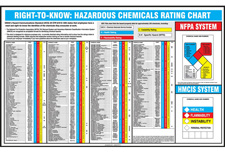



Find all of your laboratory and workplace safety supplies at Safety Emporium!
 HNOC |
 Glossary Index |
 H-Statements |
| MSDS Topics |
Free Sites | FAQ's | Regulations | Glossary | Software | Suppliers |
| Books | Forum | Poll | Fun stuff | Quiz | Store | |
| Understand your MSDS with the MS-Demystifier | Search ALL our MSDS info | |||||
The Hazard Ranking System (HRS) is used by the U.S. Environmental Protection Agency (EPA) to place uncontrolled waste sites on the National Priority List for action under the SuperFund Act (CERCLA).
Waste sites are placed on the National Priorities List (NPL) using a set of predefined criteria, one of which is the HRS rating. Scores can be determined electronically using the EPA's Quickscore software (Windows only).
The background and history of the HRS, as well as its role in the SuperFund program, is discussed in considerable detail in Chapter 4 of the National Research Council's 1994 publication Ranking Hazardous-Waste Sites for Remedial Action which is available for free download at https://doi.org/10.17226/4781.
Some of the information assessed by the HRS is the same information that is found on Safety Data Sheets. After all, a hazardous waste is typically generated after one uses a hazardous chemical. Therefore, one will sometimes find certain HRS and SDS information in the same sources.

Keep informed about workplace hazards with proper labeling techniques and safety posters available from Safety Emporium.
See also: CERCLA, EPCRA, TRI, SARA, TSCA, RCRA.
Additional definitionsfrom Google and OneLook.
Entry last updated: Saturday, December 31, 2022. This page is copyright 2000-2025 by ILPI. Unauthorized duplication or posting on other web sites is expressly prohibited. Send suggestions, comments, and new entry desires (include the URL if applicable) to us by email.
Disclaimer: The information contained herein is believed to be true and accurate, however ILPI makes no guarantees concerning the veracity of any statement. Use of any information on this page is at the reader's own risk. ILPI strongly encourages the reader to consult the appropriate local, state and federal agencies concerning the matters discussed herein.